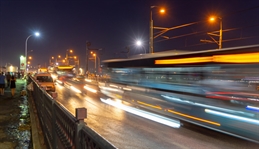
For a country which aims to be a hub of world trade, Turkey has problems connecting with other nearby countries, particularly by land.
The biggest and most obvious one is the Kapikule border crossing with Bulgaria – and hence the European Union. “There is our biggest challenge,” Emre Eldener, president of the Turkish Freight Forwarders Association, UTIKAD, told Asia Cargo News in an interview.
The largest truck crossing point in the world in terms of volume, Kapikule handles not just all the EU-Turkey trade, but also a great number of trucks from the Middle East. Queues of up to 12 kilometres on the Turkish side are not unusual – and are they aren’t significantly shorter on the Bulgarian side, according to Eldener.
“I have seen close to that line of trucks on the Bulgarian border side,” he said. “Sometimes it can take close to two days to cross the border.”
Several things have caused such a snarl up. First, Kapikule is the gateway in the EU’s hard border with the rest of the world, a key nodal point in the battle to stop refugees being smuggled or crossing into Europe, meaning there is an emphasis on physical checks, which take a lot of time, said Eldener. This is good for neither truckers nor their goods when the Bulgarian side is marked by a lack of staff.
On the Turkish side, there are five different ministries involved in the border process, slowing down any possible decision-making about making it work better.
Aware of the severe stranglehold this creates, UTIKAD is keen to see improvements and is lobbying the government. “We have taken this problem up with Fuat Oktay, the vice president of Turkey,” he said.
UTIKAD is also lobbying the government to end the requirement for transit goods to be physically inspected at ports. “We are suggesting a document check,” said Eldener. “We do not think everything needs to be physically checked.” This, he hopes, can be resolved “very soon.”
While there is a general feeling in Turkey that land infrastructure more than does the job, Eldener identifies two particular problems, both about the Bosphorus, the sea passage around which Istanbul, Turkey’s commercial capital, is built, but which creates two very different connectivity problems: one international, and one spectacularly local.
“We do not have a seamless rail link in Istanbul,” Eldener says. The lack of a rail link is, he acknowledges, a significant hole in China’s Belt and Road Initiative, one which requires goods that come to Istanbul by rail to be shipped across a four-kilometre-wide stretch of water by ro-ro ships. “That is delaying a lot of things,” Eldener said.
But there is space on one of the bridges across the Bosphorus where a rail passage can be built, Eldener says. Also due to be tendered soon is a rail tunnel under the water, which would allow goods cars to be moved seamlessly, he says.
The other is a problem typical of large, congested cities such as Istanbul, a city of some 18 million people: only one of the bridges crossing the Bosphorus is allowed to take trucks, which creates a situation where goods needing to be moved only three or four kilometres can end up being driven 70. “You end up paying more, driving more and delivering later,” Eldener said.
That said, the general feeling in Turkey is that overland connectivity within the country is not a problem.
“Turkey is actually very lucky when it comes to a delivery network. The entire country can be reached within two or three days,” Emre Ekmekci, chairman of ETID, the Association of Turkish Internet Retailers, told Asia Cargo News.
Adding to Turkey’s overall reputation as a hub are plans for a canal to the west of Istanbul that would link the Mediterranean and the Black Sea. This would relieve the Bosphorus, which limits the size of ships passing through.
Trouble is, there are some doubts as to whether the canal should be built – and whether it will be built.
“It’s a lot of government debt,” said one source who asked not to be named. Against this, the government is officially keen, as a recent statement from the transport minister showed.
Another source pointed to a map noting ships can go from the Suez Canal, already seeing its business under pressure, to anywhere else. The Istanbul Canal as it is touted could rely on the small container volumes moved out of the Black Sea and commodities from Russia and Ukraine, where stability is sometimes a concern.
Against this there is an intriguing prospect the canal would bring shipping into the equation, which would, in the words of one source, make it “more of a hub like Dubai,” where there is an air cargo facility close to Jebel Ali port.
Looking further afield, three of Asia’s boom cities, Hong Kong, Singapore and Shanghai, have major infrastructure which, if not exactly linked, is at least within easy reach. Something similar might be just possible for Istanbul, despite the present hitches.
By Michael Mackey
Correspondent | Istanbul



